2021 Annual Report | Together in a New Reality
NOTE: Please be advised that although the fax number remains in previously published documents, our fax line is no longer in service.
© Her Majesty the Queen in Right of Canada, represented by the Military Police Complaints Commission of Canada, 2022.
Catalogue No. DP1 | ISSN 1700‑6627
Letter of Transmission to the Minister
March 29, 2022
The Honourable Anita Anand, P.C., M.P.
Minister of National Defence
National Defence Headquarters
Major-General George R. Pearkes Building
Ottawa, Ontario K1A 0K2
Dear Minister:
In accordance with subsection 250.17(1) of the National Defence Act, it is my duty and privilege to submit, for tabling in Parliament, the Military Police Complaints Commission of Canada's 2021 Annual Report.
In this annual report, you will find a detailed discussion of all significant aspects of the Military Police Complaints Commission of Canada's activities during 2021, including summaries of some of its reviews and investigations of complaints.
All of which is respectfully submitted.
Yours truly,
Original signed by
_____________________________
Bonita Thornton, B.A., LL.B., CD
Interim Chairperson
Table of Contents
- Chairperson's Message
- Part 1 – Overview
- Third Independent Review of the National Defence Act
- Part 2 – The Year in Review
- Monitoring and Investigations
- Public Interest Investigation into Anonymous Complaint (Treatment of Detainees) – Final Report released
- Public Interest Investigation into a Historical Complaint Alleging Torture and Abuse of Former Canadian Armed Forces Members During Their Training – Final Report Released
- Registrar Public Interest Investigation
- Public Interest Investigation into Military Police Unit's Handling of an Investigation Involving one of its Members
- Impact on Military Policing – Case Summary & Extensions of Time
- Outreach
- Collaboration
- Part 3 – Stewardship Excellence
- Farewell to the Past Chairperson Hilary C. McCormack
- Part 4 – Conclusion
Chairpersons' Messages
I – Past Chairperson's Message
This year, the theme of our Annual Report is "Together in a New Reality".

Past Chairperson
2021 featured many challenges, opportunities, changes and renewal – perhaps more so than in any other year of the Military Police Complaints Commission of Canada (MPCC)'s history – all of which have the potential to transform the military justice and policing system and usher in a "New Reality".
A key element of our new reality has been our continued efforts to meet the significant challenges posed by the Coronavirus (COVID‑19) pandemic. As in 2020, the MPCC and its personnel have continued to adjust and adapt the way we do business in fulfilling our mandate.
I have continued to be amazed at the level of commitment and resilience demonstrated by the MPCC staff. Like in the rest of the country (and indeed, the world), the MPCC has continued to deal with the unprecedented challenges which we, as a nation, have faced together – in both our professional and personal lives.
Yet, while we are still in the grips of a global public health crisis of historic dimensions, a crisis of a different nature has continued to unfold. I am referring here to the crisis of public confidence in policing and, to some extent, police oversight as well. This is also part of the new reality.
Police oversight in Canada is well established. Indeed, Canada is seen by many to be a world leader in this field. However, we cannot allow ourselves to become complacent. There is too much at stake: confidence in public institutions once lost is hard to regain.
As police services continue with their efforts for improvement and renewal, independent civilian oversight can be a key ally for police in helping them to maintain and, in some cases, rebuild, the public's confidence or trust.
The Canadian Armed Forces has also been going through its own crisis of confidence, and leadership, in their ongoing battle against sexual misconduct. Despite the 2015 Deschamps Report and launch of Operation HONOUR, the current perception is that little has changed. This has led to yet a further study of the problem of the military's sexualized culture, launched in 2021: the Independent External Comprehensive Review into harassment and sexual misconduct in the Department of National Defence and the Canadian Armed Forces. This review is headed by former Supreme Court of Canada Justice, Louise Arbour, and is expected to report by Fall 2022.
The Military Police have not been exempt from the challenges facing the broader Canadian Armed Forces on this front. In the past few years, but especially in 2021, the military justice system and military policing have been under considerable scrutiny and criticism for the handling of allegations of sexual misconduct within the ranks of the Canadian Armed Forces. Concerns raised about military police performance regarding sexual misconduct have tended to focus on questions about military police competence and independence: the very attributes which the MPCC's oversight mandate is meant to strengthen and support. The MPCC's role, and its capacity to fulfill it, has never been more vital to Canadian military policing.
Additionally, in the spring of 2021, news stories circulated about allegations of regular interference in military police investigations. The MPCC immediately reached out to a former Canadian Forces National Investigation Service investigator who had shared his concerns with the news media. Upon learning of these allegations, the MPCC became concerned with the apparent discrepancy between these reports by former and serving Military Police members and the small number of interference complaints received by the MPCC.
In response, the MPCC proactively organized (with the cooperation of the Canadian Forces Provost Marshal) a series of virtual 'town hall' sessions on interference with Military Police members from all over Canada and around the world. The goal was to: enhance awareness of what constitutes a valid interference complaint; gain insight into the apparent under-reporting of improper interference; and discuss constructive ways that might avoid the need to make an interference complaint. We discussed how Military Police members can try to prevent or counter potential interference before a formal complaint becomes necessary. The emphasis here was on prevention and education of non-Military Police members regarding the problem of interference. These virtual 'town-hall' sessions were well attended and well received by the military police community.
This issue also reminds us of the truism that the mere establishment of an independent complaints body, while a vital first step, is not a definitive "fix" for a police service's need for civilian oversight and accountability. Police oversight is not a destination, but a journey.
There are, however, certain legislative attributes which can make that journey more productive and meaningful. In this respect, effective and credible civilian oversight of police depends significantly on certain structural attributes, such as:
- The independence of the external police oversight body from the police service that is the subject of the oversight; and
- Clear and robust authorities to access information and records which the oversight body considers relevant to its mandate.
Not only must an external police oversight body have the above attributes, in fact, it must also be perceived by the community as having them. Like justice, independent and robust police oversight and accountability must not only be done but must be seen to be done. Public trust in policing requires public trust in police oversight.
A number of other very complex and voluminous complaint reviews and investigations were also concluded in this reporting period. Against the backdrop of all of these activities, the MPCC also experienced a 30% increase in its caseload.
As the title and theme of this annual report, in addition to moving toward a new era of oversight by the MPCC, the year 2021 was also about moving forward "together".
In that connection, I wish to acknowledge that the accomplishments of 2021 were very much the result of a team effort.
I also want to acknowledge the professional and respectful cooperation from Brigadier-General Trudeau, and the rest of his Canadian Forces Military Police Group team, with whom we have continued to foster a productive, and mutually supportive relationship. One example of such collaboration between the MPCC and the Canadian Forces Provost Marshal is the successful establishment of an informal resolution procedure for conduct complaints.
On a personal note, I must add that a new era for the MPCC has begun with the end of my term as MPCC Chairperson. This is my last MPCC annual report. Once again, a big "thank-you" to the MPCC team which I have had the privilege of leading these past six years, and also to our colleagues in the Canadian Forces Military Police Group.
In closing, I would like to thank Commission Member, Bonita Thornton, for accepting the challenge of serving as Interim Chairperson of the MPCC. I start the next phase of my journey knowing that the MPCC is in good hands.
Original signed by
_____________________________
Hilary C. McCormack, LL.B.
Fellow Litigation Counsel of America
Past Chairperson
II – Interim Chairperson's Message

The year 2021 has been an especially challenging year for the MPCC – a challenge to which the MPCC has risen with its professionalism and dedication. The MPCC's ability to navigate through these challenges is, in no small way, attributable to the leadership of the preceding Chairperson, Hilary McCormack.
In addition to its continuing efforts to respond to the COVID‑19 pandemic, 2021 saw the MPCC deal with a 30% increase in its caseload. Moreover, for part of that year, the MPCC was conducting four public interest investigations concurrently. One of these investigations was initiated by the MPCC itself, the first time it has ever done so.
Ms. McCormack also led the MPCC in its successful participation in the Third Independent Review of the National Defence Act. In its April 2021 Report to the Minister of National Defence, the Independent Review Authority (former Supreme Court Justice Morris Fish) endorsed many of the MPCC's key proposals for strengthening its capacity to provide effective and credible oversight of military policing.
The MPCC has been heavily engaged with the Office of the Canadian Forces Provost Marshal, the Office of the Judge Advocate General and other key stakeholders in establishing a plan to implement the recommendations of Justice Fish's report. This advance consultation of the MPCC is unprecedented and is a further testament to the good working relationship that has been developed with our colleagues in the Office of the Canadian Forces Provost Marshal.
Once these important changes from Justice Fish's Report are adopted, and in particular those which promise greater access to relevant information for the MPCC, this will usher in a new reality for military police oversight.
In addition to all the activity outlined previously, the MPCC has had a very productive year in its treatment of complaints, which of course is our main focus. In 2021, the MPCC completed Interim Reports in three of the four outstanding MPCC Public Interest Investigations. In two of these public interest cases, Final Reports were also issued. In one of these cases, the MPCC felt that a military police call for service and investigation was so flawed, and the issues raised by the incident so serious, that, for the first time in its 22‑year history, the MPCC itself initiated a conduct complaint, which was then converted into an MPCC Public Interest investigation. Each of these cases will be discussed in detail in the body of this annual report.
This past year, the MPCC bid farewell to Commission Member Michel Séguin who served as a Commission Member for seven years including a period as Interim Chairperson. In 2021, the MPCC also welcomed two new Commission Members, Leslie-Anne Wood and Mark Ferdinand, to the team. Ron Kuban continued to serve as Commission Member for the entire year. I am grateful for their support and many contributions to the MPCC.
As noted earlier, our achievements reflect a full-team effort by the dedicated, professional and resilient staff of the MPCC. I was most gratified to see that the MPCC had regained the top spot, in the 2020 annual Public Service Employee Survey, as a workplace of choice amongst all federal government departments and agencies.
My top priority as Interim Chairperson is to preserve and build upon these achievements. With the strength and support of the MPCC team, with whom I have already been working as a Member of the Commission, I have every confidence that this goal can be realized.
Our achievements reflect a full-team effort by the dedicated, professional and resilient staff of the MPCC.
Original signed by
_____________________________
Bonita Thornton, B.A., LL.B., CD
Interim Chairperson
Part 1 – Overview
I – Military Police Complaints Commission of Canada
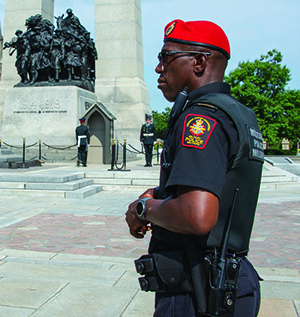
The MPCC was established on December 1, 1999 by the Government of Canada to provide independent civilian oversight of the Canadian Forces Military Police. This was achieved through an amendment to the National Defence Act (NDA) creating a new Part IV, which sets out the mandate of the MPCC and how complaints are to be handled. As stated in Issue Paper No. 8, which accompanied the Bill that created the MPCC, its role is "… to provide for greater public accountability by the military police and the chain of command in relation to military police investigations."
You will find more information about the MPCC, its mandate, mission and the Military Police on our website:
II – The Complaint Process
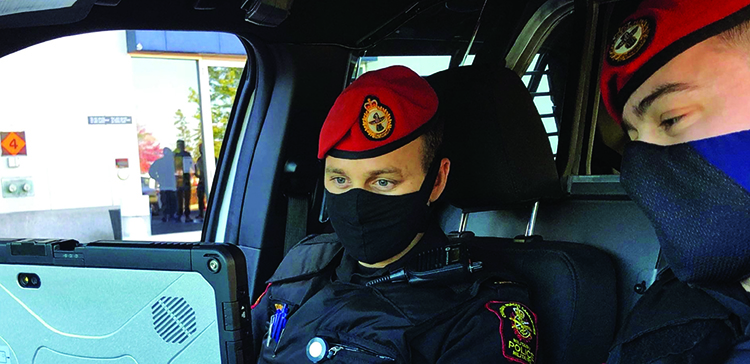
The MPCC has exclusive responsibility to examine interference complaints. Conduct complaints are dealt with by the Canadian Forces Provost Marshal (CFPM) in the first instance during which time the MPCC is responsible for monitoring these complaints. Any complainant not satisfied with the CFPM's disposition of a conduct complaint, can ask the MPCC to review their complaint and the way it was handled. In addition, the MPCC's Chairperson may, at any time, initiate a Public Interest Investigation or Hearing of either a conduct complaint or an interference complaint. The illustration on the following page sets out the steps in the complaints processes. In addition, more information on our complaint process is on our website under the following sections:
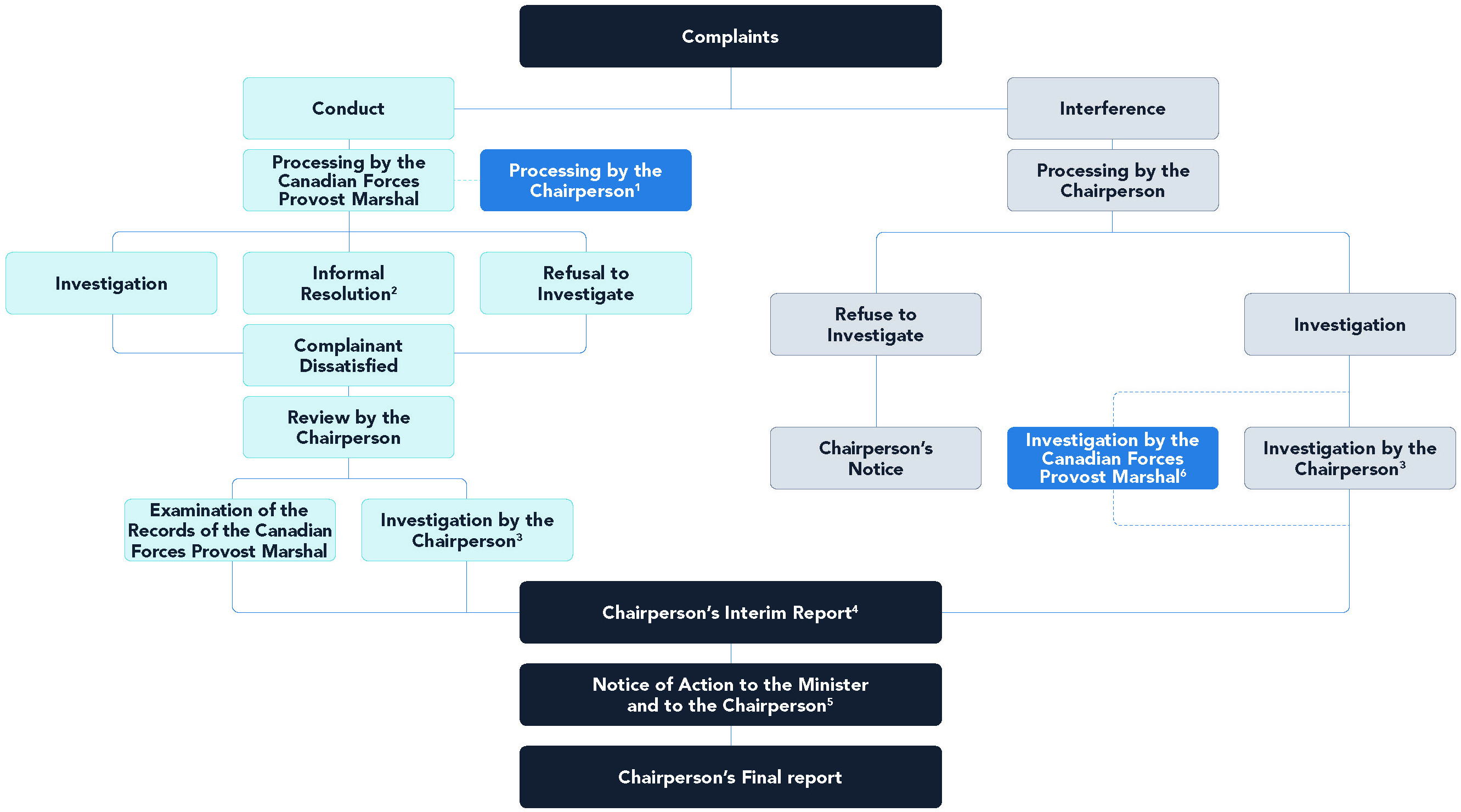
Alternate format
The image illustrates the Military Policy Complaints Commission of Canada's (MPCC) complaints process which explains the two processes, namely the conduct complaint and the interference complaint.
- Conduct Complaint
- Processing by the CFPM
- Investigation
- Complainant Dissatisfied
- Informal Resolution (does not apply to a conduct complaint of the type specified in the regulation)
- Refusal to Investigate
- Complainant Dissatisfied
- Investigation
- Processing by the Chairperson (at any time, if in the public interest, the Chairperson may take over a complaint and cause the MPCC to conduct an investigation (section 250.38 of the NDA))
- Complainant Dissatisfied
- Review by Chairperson
- Examination of the records of the CFPM
- Investigation by the Chairperson (in the public interest, the Chairperson may cause the Complaints Commission to conduct an investigation and, if warranted, hold a hearing (section 250.38 of the NDA))
- Review by Chairperson
- Chairperson's Interim Report (in the case of a hearing, the interim report is prepared by the MPCC)
- Notice of Action to the Minister and to the Chairperson (according to the nature of the complaint, the status or the rank of the subject of the complaint, the person who provides the notice could be the CFPM, the Chief of the Defence Staff, the Deputy Minister or the Minister (sections 250.49 and 250.5 of the NDA))
- Chairperson's Final Report
- Processing by the CFPM
- Interference Complaint
- Processing by the Chairperson (at any time, if in the public interest, the Chairperson may take over a complaint and cause the MPCC to conduct an investigation (section 250.38 of the NDA))
- Refusal to investigate
- Chairperson's Notice
- Investigation
- Investigation by the CFPM (exceptionally, the Chairperson may ask the CFPM to investigate)
- Investigation by the Chairperson (in the public interest, the Chairperson may cause the Complaints Commission to conduct an investigation and, if warranted, hold a hearing (section 250.38 of the NDA))
- Refusal to investigate
- Chairperson's Interim Report (in the case of a hearing, the interim report is prepared by the MPCC)
- Notice of Action to the Minister and to the Chairperson (according to the nature of the complaint, the status or the rank of the subject of the complaint, the person who provides the notice could be the CFPM, the Chief of the Defence Staff, the Deputy Minister or the Minister (sections 250.49 and 250.5 of the NDA))
- Chairperson's Final Report
- Processing by the Chairperson (at any time, if in the public interest, the Chairperson may take over a complaint and cause the MPCC to conduct an investigation (section 250.38 of the NDA))
Third Independent Review of the National Defence Act

Between November 5, 2020 and April 30, 2021, former Supreme Court of Canada Justice Morris Fish and his team (the Independent Review Authority), conducted a third independent review of the National Defence Act (NDA).
The Report of the Third Independent Review Authority dated April 30, 2021 was tabled in Parliament by the Minister of National Defence on June 1, 2021. The Minister of National Defence indicated that the Independent Review recommendations were accepted in principle by the Government.
On January 7, 2021, the MPCC submitted extensive proposals for legislative change (24 distinct items in total) intended to improve the effectiveness and fairness of the military police complaints process, and to enhance the independence of the Military Police from potential interference by the senior leadership of the Canadian Armed Forces or the Department of National Defence. The MPCC also provided background briefings and answered various queries from the Third Independent Review Authority.
The major thrust of the MPCC's submissions was to enhance the MPCC's authority to obtain relevant information. Too much of the MPCC's ability to access information relevant to its mandate is dependent on the voluntary cooperation from the CFPM and other elements of the broader Department of National Defence. Although the CFPM is usually cooperative in this regard, reliance on voluntary cooperation is contrary to basic principles of independent oversight. Such a voluntary disclosure process could undermine confidence in the MPCC as an oversight or "watch dog" body. This, in turn, can diminish public confidence in the Military Police.
In general, the MPCC's key proposals in the area of its access to information were either definitively accepted by the Government or were identified for further discussion with the MPCC and the relevant governmental stakeholders. Even in the areas where further discussion and consultation were recommended by the Review Authority, the latter indicated that it was favourably inclined toward the relevant MPCC proposal. The Third Independent Review Authority also accepted the related principle that the relevance of information requested by the oversight body (in this case, the MPCC) should be determined by the oversight body and not by the institution that is subject to the oversight.
The Department of National Defence has already been implementing a key MPCC proposal adopted by the Third Independent Review Authority: that the MPCC be consulted on proposed legislation when it relates to the military police complaints process or the MPCC itself. The MPCC is pleased to note that it has been working closely with the CFPM, the Judge Advocate General, and their representatives, on the implementation of the Third Independent Review Authority recommendations in areas relevant to the MPCC and its mandate.
The MPCC looks forward to continued collaboration with Departmental stakeholders in the improvement of the military police complaints process through the implementation of Justice Fish's report.
Part 2 – The Year in Review
I – Monitoring and Investigations

The following table highlights the MPCC statistics on a four-year comparative basis from 2018 to 2021. The table cannot fully reflect the increase in the complexity and scope of the types of complaints the MPCC handles, nor accurately predict when complex complaints will be referred. While there are standard procedures followed on each file, many follow unique paths considering the specific circumstances. For example, in the Registrar Public Interest Investigation (PII) file the MPCC self-initiated a complaint for the first time, and in the PII into Anonymous Complaint (Treatment of Detainees) file additional steps were required due to the anonymity of the complainant.
| Statistics from 2018‑2021 | 2018 | 2019 | 2020 | 2021 |
|---|---|---|---|---|
| Conduct Complaints Carried Over | 53 | 37 | 28 | 38 |
| Interference Complaints Carried Over | 2 | 1 | 2 | 2 |
| Reviews Carried Over | 14 | 14 | 17 | 11 |
| s. 250.38 Public Interest Investigations/Hearings Carried Over | 1 | 2 | 2 | 3 |
| Judicial Proceedings Carried Over (e.g. Judicial Review) | 1 | 1 | 0 | 0 |
| Other External Proceedings Carried Over | 0 | 0 | 0 | 0 |
| Total Files Carried Over | 71 | 55 | 49 | 54 |
| General Files Opened (Request for Information and Other) | 64 | 51 | 93 | 126 |
| New Conduct ComplaintsNote (A) | 37 | 47 | 41 | 51 |
| New Interference ComplaintsNote (A) | 0 | 4 | 1 | 5 |
| New Reviews | 9 | 9 | 5 | 3 |
| New s. 250.38 Public Interest Investigations/Hearings | 1 | 0 | 1 | 3 |
| New Judicial Proceedings (e.g. Judicial Review) | 0 | 0 | 0 | 0 |
| New Other External Proceedings | 0 | 0 | 0 | 0 |
| Total New Files Opened | 111 | 111 | 141 | 188 |
| Total Files under review in the Year | 182 | 166 | 190 | 242 |
| Public Interest Decisions/Rulings Issued | 1 | 2 | 2 | 3 |
| Time Extension Decisions Issued (incl. Recon.) | 8 | 10 | 7 | 6 |
| Interim Reports Issued | 6 | 5 | 10 | 8 |
| Final Reports IssuedNote (B) | 8 | 8 | 12 | 8 |
| Reports/Decisions/Rulings Issued | 23 | 25 | 31 | 25 |
| Recommendations on Final Reports | 5 | 5 | 10 | 26 |
| Percentage of Recommendations Accepted | 80% | 100% | 100% | 65%Note 1 |
| Percentage of Recommendations Not Accepted | 20% | 0% | 0% | 23% |
| Percentage of Recommendations Not Accepted | 0% | 0% | 0% | 12%Note 2 |
II – Public Interest Investigation into Anonymous Complaint (Treatment of Detainees) – Final Report released
Following a comprehensive PII, the Military Police Complaints Commission (MPCC) made 13 recommendations to improve military police investigations after receiving a complaint into the treatment of detainees in Afghanistan.
The MPCC's report is in response to an anonymous complaint received in 2015 alleging that Military Police members had abused Afghan detainees at Kandahar Airfield (KAF) in Afghanistan during a training exercise in 2011. The complaint also alleged that the Canadian commander at KAF ignored the charges that were submitted to him following an investigation by the Canadian Forces National Investigation Service (CFNIS).
In the initial phase of its investigation, the MPCC reviewed more than 3,000 pages of documents and numerous audio and video recordings that were disclosed by the Canadian Forces Provost Marshal (CFPM). This led to a determination that the scope of the PII would be limited to making findings and recommendations about the allegations related to the CFNIS investigation and decision not to lay charges.
The MPCC had to overcome a number of difficulties in completing its investigation. Because the complaint was submitted anonymously, the MPCC could not contact the complainant for clarifications on various issues related to the complaint, nor could it assess the complainant's credibility. In order to ensure that it reconciled differing accounts of the events that occurred, the MPCC conducted interviews with more than 70 witnesses across Canada, as well as with the six Military Police members who were identified as subjects of the complaint.
While the allegations in the complaint were found to be unsubstantiated, the MPCC did identify a number of deficiencies in the investigation into the 2011 training exercise conducted by the Military Police.
The deficiencies included the selection and lack of supervision of the lead investigator and the lack of adequate support for him; the lack of investigation planning, the selection of witnesses, poor interview planning and a failure to identify conflicts of interest.
The MPCC's 13 recommendations relate to a number of identified deficiencies, including note-taking practices during investigations, preparations for witness interviews, the need for a better system for the repatriation and storage of military police files following the end of an overseas operation, and improvements in communications between military police investigators and regional military prosecutors.
The MPCC also recommended that the Department of National Defence take steps to have the National Defence Act (NDA) amended to allow the MPCC to access legal advice sought and received by military police. However, access to such privileged information would only be needed when it is critical to deciding the complaint. Access to such privileged information has been given to the Civilian Review and Complaints Commission (CRCC) for the Royal Canadian Mounted Police (RCMP), a body with a very similar mandate to that of the MPCC. This recommendation by the MPCC is consistent with submissions which were made to retired Supreme Court of Canada Justice Morris Fish in his recent review of the military justice system.
In his Notice of Action, the CFPM accepted all of the MPCC's findings. Of the 13 recommendations made by the MPCC, six were accepted, six were not accepted, and the CFPM deferred responding to one of the recommendations, recommendation #12, to the Minister of National Defence to whom the recommendation was addressed. At the close of 2021, the MPCC continued to await a response from the Minister in relation to recommendation #12. The MPCC intends to re-issue its report once the response from the Minister is received.
Visit our website to see the Final Report.
III – Public Interest Investigation into a Historical Complaint Alleging Torture and Abuse of Former Canadian Armed Forces Members During Their Training – Final Report Released
Following a PII, the MPCC found that a military police conduct complaint regarding the adequacy of a CFNIS investigation into historical allegations of torture and abuse of former members of the Canadian Armed Forces are not substantiated.
The allegations were made by a participant in training exercises at the Infantry Battle School at Canadian Forces Base (CFB) Wainwright between October 1983 and March 1984. The complainant, Jeffrey Beamish, alleged that he and 32 other recruits were stripped naked, placed in small prison cells and sprayed repeatedly with cold water while the window to the cells was kept open during sub-zero temperatures in February. They were also subjected to interrogation under a cold shower that went on for several hours.
The recruits were denied access to food or drink, as well as sanitary and toilet facilities. Mr. Beamish and a number of the former trainees have stated that they now suffer from Post-traumatic stress disorder as a result of the exercise.
The complaint was filed with the MPCC in December 2016. Following a preliminary review of material related to the case, MPCC Chairperson Hilary C. McCormack decided to conduct a PII into the complaint in April 2018.
The MPCC interviewed 40 witnesses during its investigation, which found that the training exercise took place, more or less as alleged by the complainant. The investigation determined that the exercise was not an officially authorized part of the Battle School training and that it was not in keeping with basic infantry training standards at the time.
In addition to the primary allegation, that the CFNIS conducted an inadequate investigation into his claims of torture and abuse, Mr. Beamish made four other allegations related to the CFNIS investigator's handling of the underlying criminal investigation. The PII determined that all five allegations were unsubstantiated, however the MPCC made five recommendations designed to improve military police investigations and oversight.
The PII determined that a Regional Military Prosecutor advised the CFNIS that charges under the Code of Service Discipline of the NDA would not be possible because of the limitation period for military offences in force at the time of the training exercise with respect to military offences. Subsequently, a provincial Crown Attorney in Alberta was consulted, and advised the CFNIS that there was not a reasonable prospect of conviction in respect of any applicable criminal offences.
After considering the advice of both the military and the civilian prosecutors and considering the totality of the evidence, the lead CFNIS investigator and his superiors determined that charges would not be laid.
In its Final Report, the MPCC made three recommendations to the CFPM and two to the Minister of National Defence that address a range of issues:
CFPM
- The need for further training for Military Police members on how they explain charge-laying decisions to victims;
- The need to ensure that Military Police scan all emails pertaining to those investigations into their electronic investigation files;
- The need for Military Police investigators to be transparent in explaining no-charge decisions to victims, including, where necessary, by sharing with them any relevant prosecutorial advice; and
Minister of National Defence
- That the Minister take steps to have the MPCC added to the Schedule of investigative bodies under the Privacy Act, who may obtain personal information relevant to their respective mandates. This would better enable the MPCC to gain access to relevant records held by offices and entities that are external to the Canadian Forces Military Police Group;
- That the Minister support the MPCC's access to relevant solicitor-client privileged information in appropriate cases on terms equivalent with those granted to the Civilian Review and Complaints Commission for the Royal Canadian Mounted Police.
The CFPM fully accepted two of the three MPCC recommendations addressed to him while partially accepting the third recommendation, which pertains to the need for transparency for victims regarding charge-laying decisions. While the CFPM supported transparency and accuracy when explaining charging decisions to victims, he stipulated that this should not extend to information subject to solicitor-client privilege. The CFPM argues that disclosure of such information would undermine the independence and confidence of Military Police (although it is not apparent to the MPCC how this effect would occur). At the close of 2021, the MPCC continued to await a response from the Minister of National Defence to the two recommendations addressed to that office. The MPCC intends to re-issue its report once the response from the Minister is received.
Visit our website to see the Final Report.
IV – Registrar Public Interest Investigation
On October 20, 2020, Chairperson Hilary McCormack decided that the MPCC would conduct a PII into a complaint concerning the actions of the Military Police Kingston Detachment in relation to military police investigations involving Officer Cadets at the Royal Military College of Canada (RMC). This is the first PII to be launched concerning a complaint initiated by the MPCC itself.
The public interest considerations present in this case included the systemic issues raised around suicide and the safety of complainants, the seriousness of the questions concerning the criminal harassment and sexual offences investigations, and the risk of potential negative perceptions that may have an impact on confidence in the Military Police or even discourage potential victims or complainants from coming forward.
The MPCC investigated whether the Military Police members who came into contact with a member of the Canadian Armed Forces who was suffering from a mental illness took reasonable steps in the circumstances to address the situation. This PII looked into whether Military Police members who were furnished with an allegation and evidence concerning a situation that appeared to amount to criminal harassment conducted a reasonable investigation into the matter.
Further issues addressed are whether Military Police members who were told by a complainant that she feared for her safety from a man harassing her took reasonable steps in the circumstances and whether the investigation into sexual offences allegedly committed by the female Officer cadet was reasonably conceived and carried out. Finally, the PII probed whether there was adequate oversight in this matter provided by supervisory Military Police members.
The MPCC started to interview witnesses on November 30, 2020 and in December 2020 the subjects were notified of their involvement and provided with opportunities to provide their input. Interviews concluded on July 21, 2021. On September 29, 2021 the MPCC submitted its Interim Report setting out its findings and recommendations to the CFPM and to the Minister pursuant to s. 250.39 of the NDA. At the close of 2021, the MPCC was awaiting the Notices of Action pursuant to s. 250.49 and s. 250.51 of the NDA. Following the receipt of the Notices of Action, the MPCC will issue its Final Report which will be made public on its website.
V – Public Interest Investigation into Military Police Unit's Handling of an Investigation Involving one of its Members
The MPCC is conducting a PII into the handling of an investigation by a Military Police Unit (MPU) into one of its own officers.
On March 10, 2021, a Military Police officer (MPO) who appeared to be intoxicated, attempted to drive home with the MPO's children after leaving a restaurant. The Military Police officer put the children in the car, however bystanders believing the MPO to be intoxicated intervened and prevented the MPO from getting in the car.
The local Police soon arrived on scene. When they learned that the person involved was a Military Police member, the local MPU was advised and one of their members attended the scene. The local Police elected to waive jurisdiction over the incident in favour of the Military Police members.
Members of the MPU soon became concerned over the way the case was allegedly handled by the unit commander and the sergeant-major for the following reasons:
- Alterations were made to the Military Police investigator's electronic investigation report without the investigator's knowledge or agreement.
- The MPU commander and the sergeant-major repeatedly advised the investigator that charges would not be laid regarding the incident.
- Failure to report the incident to the CFNIS, who have jurisdiction to investigate offences by Military Police members.
- Failure to report the incident to the Office of Professional Standards of the CFPM.
- Subordinate MPU members were directed to not report the incident and threatened those who did so with reprimands and/or being posted to an MPU in another region of the country.
On the basis of these concerns, members of the MPU filed interference and conduct complaints with the MPCC in late April 2021.
A further related interference complaint was filed with the MPCC on July 15, 2021. This complaint alleges interference with a child welfare investigation which implicated the same Military Police officer who is the subject of the investigation of the original incident.
These complaints allege that the MPU's leadership attempted to cover up the alleged misconduct of an officer of that Unit and improperly gave special treatment to the Military Police officer involved.
It is also alleged in the complaint that details of this incident and the way it was handled by the MPU have become widely known within the local law enforcement community.
The allegations in these complaints go to the very core of police values and ethics. They have the potential to undermine public confidence in the Military Police and their adherence to basic precepts of the rule of law: namely, the principle of equality before the law.
Under the military police complaints process, the MPCC is responsible for investigating interference complaints. The CFPM deals with conduct complaints in the first instance, subject to review by the MPCC.
Given the seriousness of these complaints, and the desire to address them in a timely and coherent manner, MPCC Chairperson Hilary McCormack decided on August 3, 2021, that the public interest would best be served by having the MPCC address them together and at the same time. The Chairperson has therefore invoked her discretionary authority to conduct a public interest investigation of a complaint, pursuant to s. 250.38 of the NDA.
Further details on this PII are available in the Decision to conduct a PII.
Updates on the progress of the investigation will be posted on our website, under the header "Timeline".
VI – Impact on Military Policing – Case Summary & Extensions of Time
The section below summarizes a selected conduct case completed by the MPCC in 2021 as well as a spotlight on Extensions of Time.
i – Conduct Case Summary MPCC 2016‑037 – Need for coordination and professionalism by Military Police while investigating alleged child abduction
The complainant alleged being unlawfully arrested by the Military Police, abusing their power and traumatizing the complainant's two minor children. Specifically, the complainant alleged being wrongfully suspected of kidnapping the complainant's two children and, despite being cooperative with the Military Police, was arrested and handcuffed without regard to a medical condition declared by the complainant.
The Office of Professional Standards (PS) of the CFPM dealt with the conduct complaint in the first instance. Since there was a concern regarding the legality of the arrest and the manner in which the Military Police investigation was recorded in the General Occurrence file, the CFNIS conducted an investigation into the actions of the Military Police members involved, while PS held their investigation in abeyance.
The CFNIS concluded there was insufficient evidence to support charges under the Criminal Code or Code of Service Discipline against the Military Police members. PS then resumed their investigation, which consisted of a review of the military police and the CFNIS files. PS investigated two allegations affecting six Military Police subjects. One allegation was that the complainant was treated unfairly by the Military Police during the arrest, and the other was that the complainant was treated in an aggressive manner. PS concluded that both allegations were unsubstantiated.
The complainant was not satisfied with the PS decision and referred the complaint to the MPCC for review. In doing so, the complainant noted that PS did not view the Mobile Vehicle Recording System (MVRS) recording prior to concluding that the Military Police members' conduct was reasonable.
Upon receipt of the complaint, the MPCC requested disclosure of all relevant military police file materials from the office of the CFPM. Following an initial assessment of the complaint, the MPCC conducted a detailed review of the materials received from the CFPM that included a viewing of the video recording and determined that further investigation was required. The MPCC also decided to review the CFNIS investigation as a "matter relating to the complaint" as per subsection 250.32(2) of the NDA.
The MPCC interpreted the complaint and the related matter as comprising four allegations. The first three allegations related to the six Military Police subjects who were identified by the CFNIS in the initial complaint. The MPCC named four CFNIS investigators as additional subjects in the request for review in relation to the fourth allegation. The MPCC interviewed the complainant, subjects and witnesses. It also reviewed the relevant video and other recordings and requested further disclosure of documents. The allegations as investigated by the MPCC and the respective findings are summarized as follows.
1. The Military Police detention and arrest of the complainant was both unlawful and unprofessional. (substantiated)
The MPCC found that the principal subject Military Police member did not have reason to place the complainant in handcuffs; did not have reasonable and probable grounds to arrest the complainant; did not inform the complainant of the reason for detention and arrest; and used profanity and made inappropriate comments when speaking to the complainant. The principal subject Military Police member also failed to exercise discretion to assess the need for medical accommodation, and the impact on the complainant and the minor children of the ill-measured and unreasonable military police response being conducted in full view of the complainant's neighbours.
2. The Military Police failed to conduct a proper investigation into the status and safety of the children that were allegedly kidnapped by the complainant. (partially substantiated)
Although the Military Police member's first duty in this matter was to locate the children and ascertain their safety, vital information obtained from the first call the Military Police member made with the complainant, prior to any physical response by the Military Police, was not taken into consideration during the active investigation. This included the identity of the complainant, the complainant's spouse and their children; the fact that the complainant and their spouse were separated and that there was no custody order in place; and that the complainant was cooperative and compliant with the Military Police during the investigation. The principal subject Military Police member did not interact with the children in anyway, and basic information from the Military Police members who did interact with them was also not taken into account during the Military Police response. The collective actions of some subject Military Police members lacked coordination and failed to clarify the legal status of the children and the complainant's right to have the children with him.
3. The Military Police failed to conduct a proper investigation; it was mishandled and contained serious procedural failings. (substantiated)
The MPCC found that during the Military Police response, the principal subject Military Police member was confused about which alleged offence was being investigated; misinformed the complainant of the offence that was allegedly committed; and misinformed the on-site supervisor of the facts. Further, the information entered in the Military Police General Occurrence file was factually incorrect, incomplete and not timely, and the Military Police members' notes were either insufficient or absent.
4. CFNIS Investigators failed to conduct a proper investigation. They did not interview key individuals or review relevant evidence as part of their investigation and concluded their investigation providing a justification for the Military Police action in the face of evidence to the contrary. (substantiated)
The MPCC found that the CFNIS did not interview key individuals or review all relevant evidence as part of their investigation and concluded their investigation providing a justification for the Military Police action that was contrary to the evidence.
The MPCC made eight recommendations and one observation, summarized below.
Recommendations:
1 & 2. The principal subject Military Police member should receive training on situational assessments to ensure his understanding and practice of assessing the need for and execution of a high-risk vehicle stop; ensure the correct approach when assessing a Canadian Police Information Centre (CPIC) "caution V" (violence); the importance of assessing a person's claim of medical disability and executing proper accommodation in response as needed; and the execution of a lawful arrest and best practices regarding investigations and arrests under the offences of s. 279, s. 282 and s. 283 of the Criminal Code.
3. In light of the seriousness of the principal subject Military Police member's misconduct, he should also work with a Military Police coach to ensure they receive proper supervision over an extended period of time with a particular focus on the policing duties and functions of, for example, proper de-escalation techniques, how to interact with possible suspects and arrestees in a professional and courteous manner, proper arrest techniques, proper use of force, and use of police discretion.
4. Given the seriousness of the principal subject Military Police member's misconduct and given that he has been promoted twice since the incident underlying this complaint occurred and is therefore moving up the Chain of Command (CoC), increasing in rank and responsibilities, the MPCC also recommended that further significant corrective action in addition to the above be determined by the CFPM.
5. Given the seriousness of the principal subject Military Police member's misconduct and the negative consequences that the complainant had to endure as a result, the MPCC recommended that the CFPM issue a written apology to the complainant regarding this matter.
6. The MPCC also recommended that the Canadian Forces Military Police Orders (CF MP Orders) be updated to detail the proper procedures for handcuffing as clear written documentation will complement any training provided to Military Police members and will better assist them in executing these policing duties and functions as required.
7. Three other subject Military Police members should be provided training on situational assessments and the elements of the offences of s. 279 kidnapping, s. 282 abduction in contravention of custody or parenting order and s. 283 abduction of the Criminal Code.
8. Four subject Military Police members including the principal subject Military Police member should review the CF MP Orders concerning note-taking and receive additional training to correct their note-taking practices and ensure compliance with police best practices.
Observations:
The MPCC observed that PS did not perform an independent investigation into the alleged professional misconduct of the Military Police members, but rather reviewed the CFNIS criminal investigation. PS based their findings regarding Military Police misconduct on the CFNIS conclusion to not lay charges for Criminal Code and Code of Service Discipline offences. There is also no indication PS addressed the concerns raised by the CoC regarding confidence in the principle subject Military Police member's abilities and the possible need for remedial action.
In response to the MPCC's Report, the CFPM accepted the MPCC's findings, recommendations and observation in this matter.
In the letter of apology issued by the CFPM, he thanked the complainant for filing the request for review and advised of the implementation of training plans for the individual subject Military Police members involved in the matter as well as instruction based on scenarios; of an internal investigation into the issues raised that could result in disciplinary and administrative measures as required; and that he instructed PS review internal processes to ensure investigations are conducted independently and in a manner to correctly evaluate allegations of professional misconduct.
In response to the recommendations, the CFPM ordered individualized training plans and follow up evaluations including situational assessments for the subject Military Police members involved regarding note taking and knowledge of the three Criminal Code offences. Additionally, the CFPM advised that the principal subject Military Police member will be monitored and assessed to validate his understanding and performance of military police duties conform to the professional standards. The supervisors of respective subject Military Police members are to confirm in writing the completion of the training and evaluation such that subject Military Police members' abilities conform to the professional standards applicable. The CFPM also ordered that CF MP Orders be updated to detail the proper procedures for handcuffing and that the CO CFNIS develop an action plan to address the CFNIS shortcomings identified within the MPCC's report. Lastly, PS is to conduct a full-day professional development session with all serving investigators which is to include a detailed review of the MPCC's report and focus on lessons learned and the way-ahead. The CFPM also ordered that the completion of both the CFNIS action plan and the PS Professional Development session be confirmed in writing.
ii – Spotlight on Extensions of Time
Normally, a complaint must be filed within one year of the incident in question. However, s. 250.2 of the NDA gives the Chairperson the discretion to extend this time limit. Each year we receive several complaints that are beyond the time period and require extensions of time. In recent years the media coverage on issues of sexual misconduct in the military and police misconduct against vulnerable groups has generated some requests for extensions of time. In the MPCC's communications with the complainants it is apparent that they often do not understand that they must request an extension and what information is relevant: media coverage of an issue might be relevant, but most important will be the complainant's explanation for the delay and the efforts made to pursue the complaint.
Process
When the MPCC receives a complaint which appears to be beyond the time limit, Registry staff reaches out to the complainant to clarify the dates, confirm that they wish to request an extension and ask for their explanation for the delay and any other information they wish to provide. Often the MPCC will also communicate with the Office of Professional Standards of the CFPM: In the case of a conduct complaint to verify if the person being complained about is a Military Police member; in the case of an interference complaint to verify that the complainant is a Military Police member. The MPCC may also need other information relevant to the Chairperson's decision such as when a particular military police investigation was closed.
Guiding Principles
The Chairperson evaluates extension of time requests on a case-by-case basis and provides detailed written reasons for the decision. While the Chairperson has a very broad discretion, the NDA has a clear time limit and any exception to the time limit is carefully considered. The Chairperson normally will review the request based on the following non-exhaustive criteria or questions:
- Is this complaint clearly outside the jurisdiction of the MPCC?
- Has the complainant reasonably explained the entire delay in making this complaint?
- When did the complainant find out that they had an issue to complain about?
- What efforts has the complainant made to advance their concerns? What evidence of these efforts have been provided (Access to Information and Privacy records, court documents etc.)
- Has the complainant demonstrated a continuing interest to advance the concern or did they decide not to do so and later changed their mind?
- How long was the delay?
- Was there a criminal matter that needed to be completed first? Has the complainant provided evidence of this such as court records?
- Is the complainant particularly vulnerable or faced specific barriers? Has the complainant provided evidence of these issues?
- What obstacles existed and were they beyond the control of the complainant?
- Has the complainant provided evidence?
- How serious are the allegations being made?
- Some prejudice is always assumed for the potential subjects of a complaint if a complaint is late
- Are there records which would help to lessen this prejudice?
- Public Interest factors
- Have there already been various proceedings about the same issues?
- Does the complaint raise systemic issues or the overall professionalism or independence of the Military Police?
- Has there been public comment on the specific issues which need clarification?
- Any other relevant factors or issues particular to the complaint?
This is not a checklist but any of these might be relevant for the Chairperson to consider. The Chairperson's decision and reasons are provided to the complainant in writing. The decision of the Chairperson is final, subject only to an application for judicial review in the Federal Court of Canada.
VII – Outreach
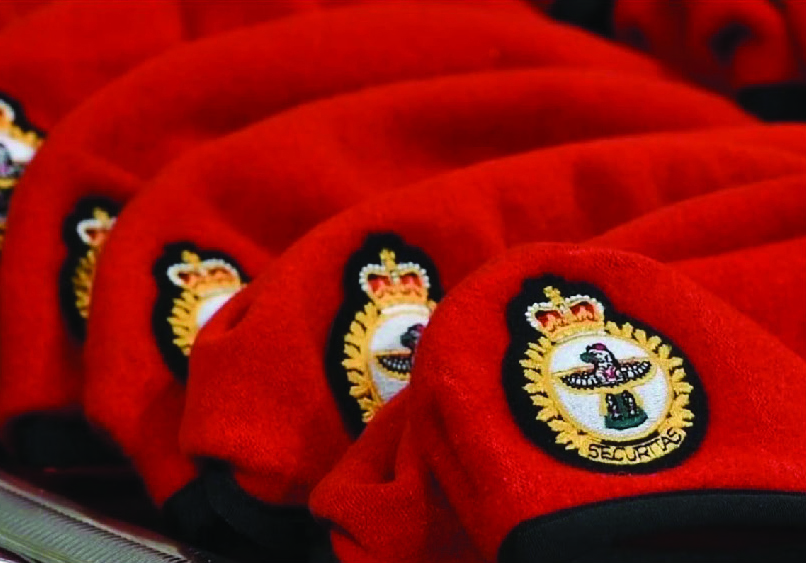
The MPCC's outreach program is key to building relationships with the Military Police, the community they serve, the Canadian Armed Forces (CAF) at large as well as other key stakeholders. In 2021, the MPCC continued piloting a virtual outreach program across the country and trying new ways of delivering outreach by leveraging technology. The MPCC greatly appreciates the efforts of the many individuals who organized, supported, and participated in its outreach activities at the bases and the Canadian Forces Military Police Academy (CFMPA) as well as at other events.
i – Presentation at Army Council
The Chairperson, Hilary McCormack, presented at the Army Council in September 2021. The audience was comprised of the senior leadership of the army and it was one of the rare in-person events which took place this year. The talk focussed on the importance of confidence in an independent military police being crucial to effective policing. The discussion was much appreciated by all participants. We look forward to further engagements with the Army Council.
ii – Presentation to the Canadian Forces National Investigation Service (CFNIS)
Once again this year, the MPCC was invited to present at the training session for new CFNIS members. Chairperson Hilary McCormack and MPCC Senior General Counsel and Director General, Julianne Dunbar, attended and provided the new members with a very useful discussion on our mandate and the importance of professionalism in the work of CFNIS members.
iii – National Town Halls on Interference
In response to the news coverage of systemic interference in the military police investigation process, particularly in the investigation of sexual assault allegations, the MPCC held a series of four virtual national town halls with Military Police members to discuss interference and the interference complaints process. The four sessions were interactive and very well received. We were pleased that 87 Military Police members registered to the events, including a number of Military Police members posted overseas.
iv – Canadian Armed Forces Locations across Canada

These virtual sessions with participants across Canada increase awareness of the MPCC's mandate and activities, build relationships with stakeholders and provide an opportunity to respond to questions and concerns about the complaints process. The primary audiences are:
- members of the Military Police who may be subjects, complainants or witnesses in conduct or interference complaints;
- the military chain of command, which relies on the services of members of the Military Police to maintain military discipline, but cannot interfere with police investigations; and
- those who may interact with the Military Police because they live, work, or visit a CAF base. The MPCC's connection to this group is often made through the executive directors and staff of the Military Family Resource Centre (MFRC) at each base.
The MPCC's goal is to reach as many members of the military family as possible, while respecting the operational realities of CAF bases and wings across the country and abroad.
Following the success of the virtual national town halls on interference, as well as some other pilot outreach sessions, and in response to the ongoing threat of COVID‑19, the MPCC launched a series of national virtual outreach sessions in the Fall of 2021. The new program allows members of the primary audience to register to an event at the date and time of their choice. Rather than restrict each session to one base, each session was aimed at a particular audience and offered widely. We delivered 4 sessions to MFRC audiences, 8 to military police audiences, and 6 to Command team members. A total of 172 participants attended virtual outreach sessions throughout the year.
The feedback provided by participants was extremely positive. Their feedback and our experience will be used to continue to improve the design and delivery of further virtual outreach sessions in the coming year.
v – Canadian Forces Military Police Academy (CFMPA)
The MPCC delivers regular outreach sessions to the CFMPA located in Borden, Ontario as part of its curriculum. Again this year, the MPCC presented virtually to the graduating Qualifying Level 3 (QL3) classes in the spring and fall. We appreciated the opportunity to impress on 92 new Military Police members the importance of police oversight.
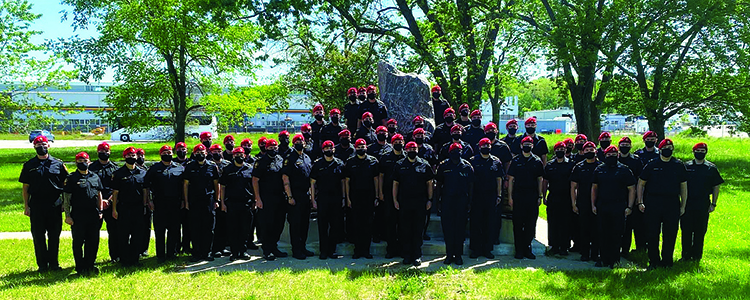
vi – Canadian Forces Military Police Academy (CFMPA)
The Canadian Association for Civilian Oversight of Law Enforcement (CACOLE) is a national, non-profit organization of individuals and agencies dedicated to advancing the concept, principles and application of civilian oversight of law enforcement organizations across Canada and abroad. CACOLE is recognized worldwide for its policing oversight leadership. The MPCC's Chairperson is a member of the CACOLE Board of Directors.
CACOLE held its annual educational conference virtually in 2021 due to the COVID‑19 pandemic and was attended by the Chairperson and several members of the MPCC.
VIII – Collaboration
Throughout the year, the MPCC continued to work towards resolution of a number of complex and challenging matters with the National Defence leadership, the CFPM, the military chain of command and the military police community. This work is undertaken with a view to making the complaints process more efficient and effective. Notably, after the release of the Report of the Third Independent Review Authority to the Minister of National Defence, the MPCC has taken part in Working Group meetings with CAF and Department of National Defence officials at both the Chairperson and working levels to ensure the implementation of the recommendations contained in this Report.
i – Canadian Forces Provost Marshal (CFPM)
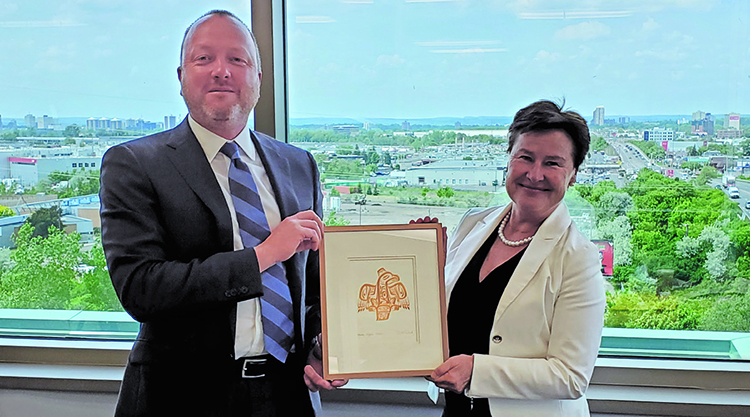
The MPCC Chairperson and the CFPM continued the practice of having annual meetings to discuss matters of mutual interest, including their core mandates and objectives. This year, the meeting took place on June 2, 2021. These meetings provide an opportunity for the MPCC Chairperson, the CFPM, along with their respective key staff to discuss issues with respect to the complaints process and to find ways to improve the process. These meetings have been fruitful in ensuring strong lines of communication and a collaborative relationship. This has been reinforced by regular meetings between the MPCC Senior General Counsel and Director General and the Deputy Commander of the Canadian Forces Military Police Group / Office of Professional Standards of the CFPM. MPCC personnel have also engaged as needed with PS staff to maintain a professional and collaborative relationship to address issues as they arise.
Part 3 – Stewardship Excellence
I – Financial Management
In 2021, the MPCC continued to demonstrate sound management of its financial resources. It effectively planned, managed and controlled its budget and expenditures to meet operational needs and increased central agency requirements, including timely and accurate financial reporting. In 2020, an Internal Control Management Framework was approved by the MPCC Executive Committee. This framework included a five-year internal control audit plan for which the MPCC competitively bid in 2021 and contracted with an audit firm. The results of the Year 1 audit will be provided to the MPCC Executive Committee in the spring of 2022.
Operating Budget: The current annual budget for the MPCC is $4.4 million. It is used to support the MPCC's legislative mandate under Part IV of the National Defence Act. This includes the investigation and resolution of complaints and all other activities necessary to meet central agency requirements, including the production of the various reports required by these agencies and by Parliament (departmental plans, departmental performance reports, annual reports, annual financial statements and quarterly financial reports). In addition, the MPCC receives additional funding during the year from its operating budget carry forward and compensation allocations.
Additional Financial Information: Additional financial information about the MPCC's financial and expenditure management may be found in the Reports and Transparency Sections of the MPCC's website under Departmental Plans, Departmental Results Reports, Quarterly Financial Reports, Annual Financial Statements and Proactive Disclosures.
II – Digital Transformation
Prior to the beginning of the pandemic, the MPCC had launched an Information Technology (IT) transformation project to implement Office 365. This allowed the IT team to accelerate the implementation of Microsoft Teams throughout the organization. We also maintained extra IT support over the adoption period in order to better support employees in a virtual environment.
This new tool allowed people to collaborate productively in a virtual environment. In order to support the adoption and best utilization of these tools, all employees also attended mandatory two half day training and were provided with coaching support in the use and leveraging of Microsoft 365 collaboration tools.
In addition, the organization began using tablets that allow video conferencing to foster collaboration and communication among employees. These tools, processes and related training and support continued to be enhanced throughout the year as it became clear that virtual collaboration would become the new norm.
III – Mental Health and Wellness
The MPCC continued offering a variety of services to employees through an agreement with the Health Canada Employee Assistance Services to provide Informal Conflict Management Services including an Ombudsperson Service and an Employee Assistance Program. In addition, this year a new arm's length service for the reporting of violence and harassment situation was launched in conjunction with the new MPCC Violence and Harassment Prevention policy. The MPCC's Mental Wellness Champion, the Senior General Counsel & Director General continued to educate employees about mental health and well-being by offering a half-day session on violence and harassment prevention in the workplace and the numerous employee programs and services available. The MPCC also continued to publish information on mental health and wellness on its dedicated Microsoft Teams Channel to share resources with employees and highlight key events such as the ‘Bell Let's Talk Day', Mental Health Week, the Mental Illness Awareness Week and the World Mental Health Day. A selection of videos about mental health were presented at quarterly all-staff meetings as well as a presentation of the functionality of the LifeSpeak campaign, which provides mobile access at all times in a confidential, bilingual electronic learning platform for employees and their families.
In fact, this year the MPCC was recognized in an article of The Hill Times as tied for the title of highest rated workplace of all the agencies, big and small for engagement and employee happiness indicators. This assessment was based on the MPCC's results on the 2020 Public Service Employee Survey (PSES), published in Spring 2021. The article recognized MPCC's executive team efforts to excite, encourage, and engage their employees.

IV – Inclusiveness
Again this year, the challenges created by the pandemic did not diminish our commitment to develop an inclusive work environment where everyone feels supported and respected. Despite teleworking, the MPCC continued to create an accessible work environment by addressing barriers and proactively addressing accommodation requirements to allow for the full participation of its employees in their virtual work environment.
Similar to last year, the MPCC has supported weekly virtual coffee breaks that have been in place since the beginning of the pandemic, which helped maintain healthy relationships and a collegial culture in the workplace. These virtual coffee breaks allow for the exchange of information and help to reduce employees feeling isolated. The MPCC Social Committee also planned virtual activities to maintain this social cohesion. A weekly riddle competition, themed based coffee breaks and lunch and learns on diversity topics such as indigenous veterans are only few examples of the Social Committee's initiatives.
Events and awareness days/months were promoted through various communication channels and virtual lunch and learn events. These included Asian Heritage Month, National Aboriginal History Month, Gender Equality Week, Pride Month, Public Service Pride Week, Canadian Multiculturalism Day, National Accessibility Week and Orange Shirt Day.
We pride ourselves on the level of diversity at the MPCC with 35% of employees having self-identified as members of an employment equity group.
Farewell to the Past Chairperson Hilary C. McCormack
2021 marked the end of the tenure of MPCC's fourth Chairperson, Ms. Hilary C. McCormack. To commemorate her 6 years at the helm of the MPCC, we present a short chronology of the most significant moments of her tenure at the MPCC.
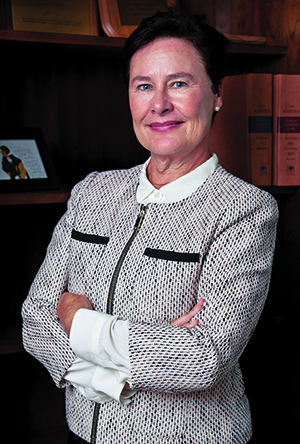
November 2015 | PII into an Anonymous Complaint about military police abuse of Afghan Detainees
Upon her arrival at the MPCC in November 2015, Chairperson Hilary McCormack launched a Public Interest Investigation (PII) in response to an anonymous complaint. The complaint alleged that in 2010‑11 the Commanding Officer of the Military Police Company stationed at Kandahar Airfield, Afghanistan conducted training exercises at the Detainee Transfer Facility in order to "terrorize" the detainees. The complainant also alleged that no charges resulted from investigations by the Canadian Forces National Investigation Service (CFNIS) and the chain of command. This was the first MPCC PII based on an anonymous complaint.
July 2016 | Comprehensive timeliness review of complaints process
In July 2016, the Chairperson launched a comprehensive timeliness review of the complaints process that resulted in an MPCC internal review of its process and the introduction of enhanced mechanisms to ensure the timely completion of investigations as well as new procedures to monitor progress.
February 2018 | Kuwait

Together with the then CFPM, Brigadier-General Robert Delaney, the MPCC Chairperson had the privilege of visiting the Ali Al Salem Air Base in Kuwait in February 2018. The Chairperson made presentations to the Military Police members and the Command structure regarding civilian oversight of policing and the MPCC mandate. The Chairperson was particularly pleased to gain a more fulsome appreciation of the Military Police’s experiences and challenges while deployed and considered this visit to be of mutual benefit.
April 2018 | Chairperson Hilary McCormack calls PII relating to military police investigation of alleged torture of Infantry Battle School trainees
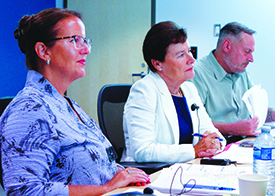
In April 2018, a complaint from former CAF member Mr. Jeffrey Beamish led to a PII. His complaint related to his treatment, and that of other platoon members, during Infantry Battle School Training at Canadian Forces Base (CFB) Wainwright, Alberta, from October 1983 to March 1984. The complainant alleges he and a group of over 30 recruits were subjected to inhumane treatment, amounting to torture, during a prisoner of war scenario exercise. This experience led him to suffer from various conditions including major depression, post-traumatic stress disorder and night terrors. Mr. Beamish made a complaint to the CFNIS about these events in 2015. In 2016, the CFNIS investigation concluded without charges.
December 3, 2019 | MPCC's 20th Anniversary Symposium
On December 3, 2019, the MPCC 20th Anniversary Symposium was held, marking the date the MPCC opened its doors on December 1, 1999. The MPCC was created as an independent, civilian, police oversight body for the Canadian Forces Military Police as a result of amendments to the National Defence Act. This responded to recommendations in the Report of the Special Advisory Group on Military Justice and Military Police Investigation Services (Dickson Report, March 1997) and the Report of the Commission of Inquiry into the Deployment of Canadian Forces to Somalia (Somalia Inquiry, July 1997). The Symposium featured a panel that discussed the future challenges in Military Policing and the implications for civilian oversight.
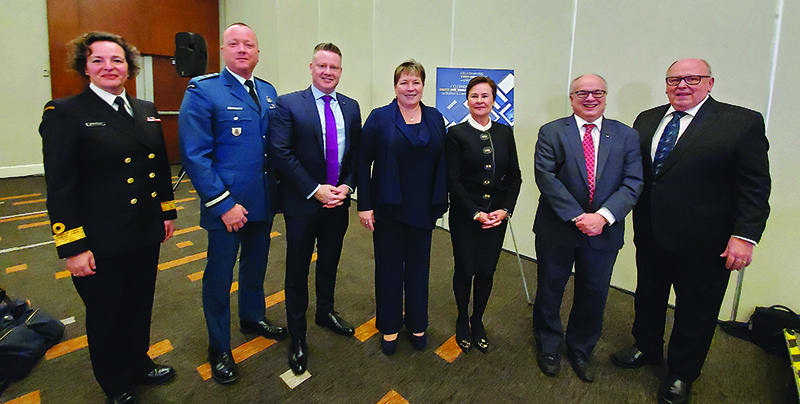
March 2020 | COVID‑19 Pandemic
On March 16, 2020, the MPCC closed its office to the public and transitioned all its operations to a virtual environment. Chairperson Hilary McCormack led the organisation through the next two years of change and adaptation as the way we work, the technology we use and the processes we follow had to evolve in response to this new reality. Through this intense period of change and transformation, employee engagement was instrumental in leading the organisation to achieve its results. The organisation's success in leading its employees and adapting to the new reality brought forward by the Pandemic was confirmed in the results of the 2020 Public Service Employee Survey which placed the MPCC at the top spot for employee satisfaction in the core public administration.
October 2020 | Registrar Public Interest Investigation
On October 20, 2020, Chairperson Hilary McCormack decided that the MPCC would conduct a PII into a complaint concerning the actions of the Military Police Kingston Detachment in relation to military police investigations involving Officer Cadets at the Royal Military College of Canada (RMC). This is the first PII to be launched concerning a complaint initiated by the MPCC itself.
August 2021 | Military Police Unit Public Interest Investigation

On August 3, 2021, Chairperson Hilary McCormack called a PII into the handling of an investigation by a Military Police Unit into one of its own officers. In March 2021, a Military Police officer (MPU) who appeared to be intoxicated, attempted to drive home with the MPO's children after leaving a restaurant. The MPO put the children in the car, however bystanders believing the MPO to be intoxicated intervened and prevented the MPO from getting in the car. The local Police soon arrived on scene and elected to waive jurisdiction over the incident in favour of the Military Police members. The MPO and the children were driven home by the responding military police member.
Members of the Military Police Unit became concerned that the Unit leadership was trying to cover up the incident and afford the MPO special treatment. These members noted that no charges were laid and they did not believe that the Canadian Forces Military Police Group chain of command and the CFNIS were notified of the incident. They brought forward two interference complaints and one conduct complaint related to this incident.
Part 4 – Conclusion
I – Interim Chairperson's Conclusion

Thanks to the efforts of the MPCC's preceding Chairperson, Ms. Hilary McCormack, and the MPCC team, the Commission is well poised to continue its evolution in a direction that will enable it to better serve the needs of the Canadian public and the Military Police.
A key demonstration of Ms. McCormack's leadership was the MPCC's successful participation in the Third Independent Review of the 1998 reforms to the National Defence Act (reforms which included the establishment of the military police complaints system and the MPCC itself).
The MPCC actively participated in this legislative review, both through its extensive written submissions, and in meetings with Justice Fish and his team. Given the tight schedule for the Independent Review Authority to complete its work, the MPCC had less than two months to prepare and deliver its submissions to the Review Authority. Fortunately, the MPCC had the foresight to commence preparation of its submissions well in advance.
If properly implemented, the results of this Independent Review have the potential to fill a number of key gaps in the MPCC's authority to access relevant information needed to resolve complaints. Too much of the MPCC's access to information has been dependent on voluntary cooperation from the Canadian Forces Provost Marshal, and the latter's assessment of the relevance of the information sought by the MPCC. This is not an arrangement which readily inspires public confidence.
Yet, it is this capacity to inspire public confidence in the overseen institution which is the litmus test for any system of oversight. In its submissions to the Independent Review Authority, the MPCC has not sought a larger mandate for itself: rather, it has sought reforms necessary to better fulfill its existing mandate.
The present opportunity to improve the system of independent oversight of the Military Police could hardly come at a more crucial juncture. Policing generally, and the Canadian Armed Forces system of military justice and policing in particular, are currently front and centre in the media these days, especially in the area of sexual assault and sexual misconduct cases.
With the appropriate tools for obtaining relevant information, we at the MPCC look forward to continuing to collaborate with the Canadian Forces Military Police Group to help ensure that they are able to discharge their responsibilities in a way that maintains the confidence of Canadians. I have every confidence that, going forward, the Military Police and the MPCC will continue to build upon their positive and productive relationship for the betterment of Canadian military policing.
Original signed by
_____________________________
Bonita Thornton, B.A., LL.B., CD
Interim Chairperson
II – Our Organization
i – Biography of the Past Chairperson
Hilary C. McCormack, LL.B.
Past Chairperson
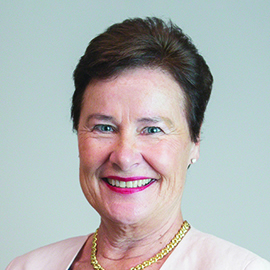
(October 2015 – October 2021)
Hilary McCormack served as Chairperson of the Military Police Complaints Commission of Canada from October 5, 2015 to October 4, 2021.
Prior to her appointment, Ms. McCormack was Director of Crown Operations (East Region) at the Ontario Ministry of the Attorney General, a position she had held since 2009. As Regional Crown Attorney, she supervised 10 Crown Attorney offices and was responsible for criminal prosecutions and summary conviction appeals in Eastern Ontario. In addition to her management duties, Ms. McCormack continued to prosecute many high profile and complex trials. She received the Ministry of the Attorney General Excelsior Deputy's Award in 2010.
Ms. McCormack graduated from the University of Western Ontario's law school. Following her call to the Ontario Bar in 1980, she was in private practice for three years before joining the Ontario Ministry of the Attorney General as Assistant Crown Attorney in 1983. She was seconded to the federal Department of Justice in 1992. Her work as General Counsel, Criminal Law and Policy, resulted in amendments to the Criminal Code which enhanced the general protection of women and children from sexual and physical violence for which she received the Department of Justice Deputy Minister's Merit Award in 1994.
She returned to the Ontario Ministry of the Attorney General in 1994 where she continued to prosecute complex homicides and to develop her expertise in a number of criminal justice issues: child abuse, sexual assault and domestic violence; best practices in case management and trial processes and mental health. Over the course of her career, she travelled to Thailand and Kosovo to provide legislative and policy advice in these areas and frequently hosted many foreign delegations, including delegations from Russia, China, Afghanistan and the Palestinian Authority, on systemic issues and best practices.
Ms. McCormack prosecuted the first case in Canada to successfully use DNA evidence. She subsequently established an ad hoc committee to provide advice about the use of DNA evidence to Crown prosecution services and police services across Canada and internationally. She also worked on policy and legislative initiatives for both the DNA warrant provisions and the DNA data base which have transformed policing and prosecutions in Canada. This interest in facilitating transformative change also prompted her to implement a Drug Treatment Court, an Adult Mental Health Court and, for the first time in Canada, a Youth Mental Health Court while she was the Crown Attorney for Ottawa, an appointment she received in 2000, and the first woman to ever hold that position.
Between 2000 and 2005, Hilary McCormack was a member of the Department of National Defence's Military Police Advisory Committee which provided advice to senior military leadership about significant changes to the Military Police and their investigative capacity. The committee's recommendations improved the Military Police's relationship with civilian courts and prosecution services, and provided opportunities for enhanced police training and education. In April 2016, she was formally inducted into the Litigation Counsel of America (LCA) at the LCA's 2016 Spring Conference & Celebration of Fellows. She is a member of the International Commission of Jurists Canada.
Hilary McCormack has taught criminal law at the University of Ottawa, at the Bar Admission course, and served on the faculty of the Federation of Law Societies Criminal Law program. She is a frequent speaker at judicial, legal and police conferences, helped develop instructional material for the National Judicial Institute, and written and published extensively on various legal issues. She has served as a volunteer on the boards of directors and committees of not-for-profit organizations.
ii – Biography of the Interim Chairperson
Bonita Thornton
Interim Chairperson / Commission Member

(March 2018 – present)
Ms. Bonita Thornton was appointed as a Commission Member in March 2018 and assumed the role of Interim Chairperson effective October 5, 2021
Ms. Thornton is a lawyer, adjudicator, manager and military veteran with extensive government and regulatory experience in administrative and criminal law. She is also a Board Member with the Health Professions Appeal and Review Board. Ms. Thornton previously led the Investigations Department at the Law Society of Ontario and the College of Physiotherapists of Ontario.
Ms. Thornton worked for twelve years as a lawyer and officer with the Office of the Judge Advocate General, Canadian Armed Forces (retired rank of Commander). From 2006 until 2012, she held the position of Assistant Judge Advocate General, Central Region, where she oversaw five legal offices across Ontario and provided advice and training to military commanders, police and personnel on a broad spectrum of legal and operational issues. She was deployed to Afghanistan in 2008‑2009 as the senior legal advisor to the Canadian Task Force in Kandahar.
Ms. Thornton has lived and worked across Canada. She graduated from Queen's Law School in 1997 and was called to the Ontario Bar in 1999. Ms. Thornton has received the Queen Elizabeth II Golden Jubilee Medal, Queen Elizabeth II Diamond Jubilee Medal and 125th Anniversary of the Confederation of Canada Medal for her contributions to Canada and her community.
iii – Biographies of the Commission Members
Michel Séguin
Commission Member

(March 2014 – March 2021)
Michel Séguin was appointed as a Commission Member on March 6, 2014 and served as a Commission Member until March 5, 2021. He served as Interim Chairperson of the MPCC from March 28, 2015 to October 4, 2015.
Mr. Séguin has extensive operational policing experience, having spent 33 years with the Royal Canadian Mounted Police (RCMP). During his service with the RCMP, he held the position of Ethics and Integrity Advisor and adjudicated Code of Conduct hearings. Mr. Séguin retired from the RCMP in 2008 as Assistant Commissioner and the Commanding Officer of "O" Division (Ontario).
After his retirement from the RCMP, Mr. Séguin joined the House of Commons Administration as Director General, Parliamentary Accommodations Services, a post he held for five years.
Mr. Séguin was invested as an Officer of the Order of Merit of the Police Forces in May 2008 and a Serving Member of the Order of the Hospital of St. John of Jerusalem in 2002. He is also the recipient of the Commemorative Medal for the 125th Anniversary of the Confederation of Canada, the Golden Jubilee Medal and the Royal Canadian Mounted Police Long Service Medal with Silver Clasp.
Mr. Séguin is an active member of the RCMP Veterans Association, the International Association of Chiefs of Police and is a Life Member of the Canadian Association of Chiefs of Police and the Ontario Association of Chiefs of Police.
Ron Kuban, Ph.D.
Commission Member

(May 2018 – present)
Dr. Ron Kuban was appointed as a Commission Member in May 2018.
A graduate of the Royal Military College in Kingston, Ontario, he completed his M.Ed. and Ph.D. at the University of Alberta. For the last 51 years, he has been employed in the public sector of Canada and Alberta, and in his consulting company regarding emergency/crisis management.
Dr. Kuban has held numerous senior positions of responsibility, both paid and voluntary. The former includes service as a Commissioned Officer in the CAF, a Commissioner on the Edmonton Police Commission, a Member of the Parole Board of Canada and until recently as a Member of the Alberta Social Services Appeals Board.
Dr. Kuban volunteered for 35 years on numerous Boards at the local, provincial and national level, and was recognized for his service. Aside from his military medals, he was awarded the Queen's Golden and Diamond Jubilee medals, as well as the Alberta Centennial Medal.
Leslie-Anne Wood
Commission Member

(July 2021 – present)
Ms. Leslie-Anne Wood was appointed as a Commission Member in July 2021.
Ms. Wood is a lawyer, trained in environmental science (B.Sc. 2004) and common law at the University of Ottawa (J.D. 2008), and in civil law at the University of Montreal (LL.B. 2008). She also obtained a Master of Laws degree from Yale Law School (LL.M. 2010).
Called to the Quebec Bar in 2009, Ms. Wood has worked in the private and public sectors, in Canada and internationally. Notably, she was a law clerk to the Honourable Marie Deschamps at the Supreme Court of Canada, where she later also acted as legal counsel. Ms. Wood practiced litigation with IMK LLP in Montreal, has taught as a lecturer at McGill University's Faculty of Law and has completed public interest internships with the Orleans Public Defenders in New Orleans and the South African History Archive in Johannesburg.
Ms. Wood grew up in Gatineau. In recent years, she has volunteered at the Society for the Prevention of Cruelty to Animals (SPCA) as a dog walker and at the Ottawa Hospital in inpatient care.
Mark Ferdinand
Commission Member

(July 2021 – present)
Mr. Mark Ferdinand was appointed as a Commission Member in July 2021.
Mr. Ferdinand is a Member at the Immigration and Refugee Board of Canada. Between 1999 and 2020, he worked as a public policy specialist and executive in the public, not-for-profit and private sectors.
An avid volunteer for over 30 years, Mr. Ferdinand has served as an expert advisor to several organizations on a range of issues, including innovation policy, population health, mental health policy, graduate education, and prescription drug misuse. He served as Chairperson of the Board of Directors of the National Initiative for Eating Disorders (NIED) from 2019 and 2021.
Mark holds a Bachelor of Laws degree from the Université de Montréal and earned a Bachelor of Arts (First Class Honours) in Italian from McGill University.
iv – Organization chart
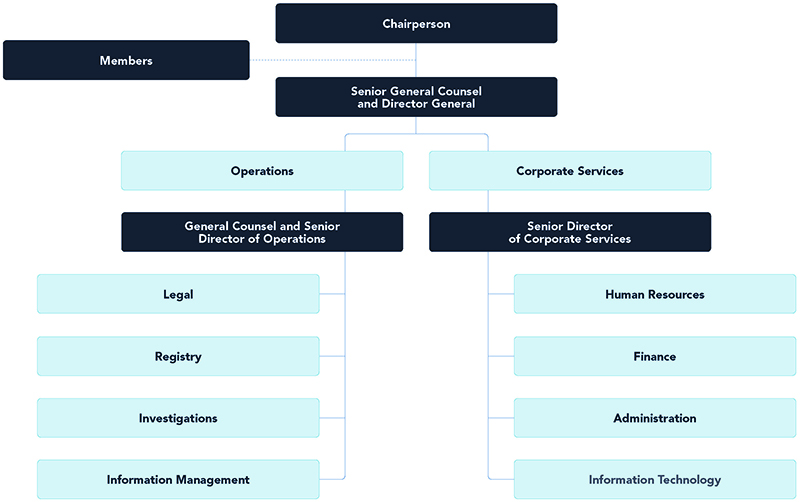
Alternate format
The image illustrates the Military Policy Complaints Commission of Canada's (MPCC) organizational structure, last updated in September 2016.
The chart is described from top to bottom starting with the highest position, being that of the Chairperson.
The Chairperson is linked to the Members, the General Counsel and Senior Director General of Operations and the Senior Director of Corporate Services.
The General Counsel and Senior Director General of Operations manages
- Legal
- Registry
- Investigators
- Information Management
The Senior Director of Corporate Services manages
- Human Resources
- Finance
- Administration
- Information Technology
How to Reach the Military Police Complaints Commission of Canada
Call our information line
613‑947‑5625 or toll-free at 1‑800‑632‑0566
Send us a fax
613‑947‑5713 or toll-free at 1‑877‑947‑5713
Send us a letter
Military Police Complaints Commission of Canada
270 Albert Street, 10th floor,
Ottawa, ON K1P 5G8
Contact us for a private consultation.
Send us an email
Note: We cannot guarantee the security of electronic communications.
Visit our website
Follow us on Twitter
Follow us on LinkedIn
Like us on Facebook
- Date modified:
